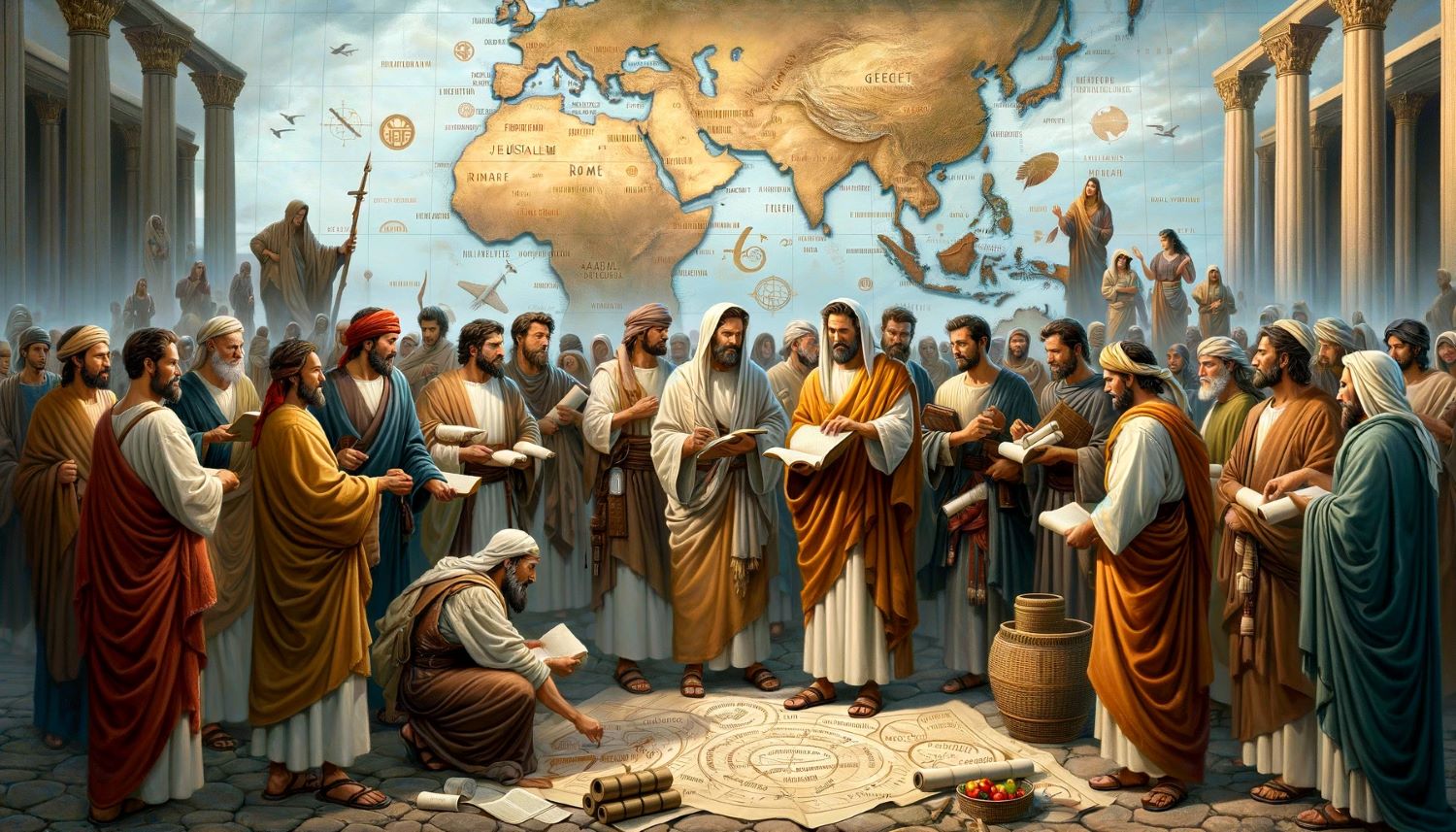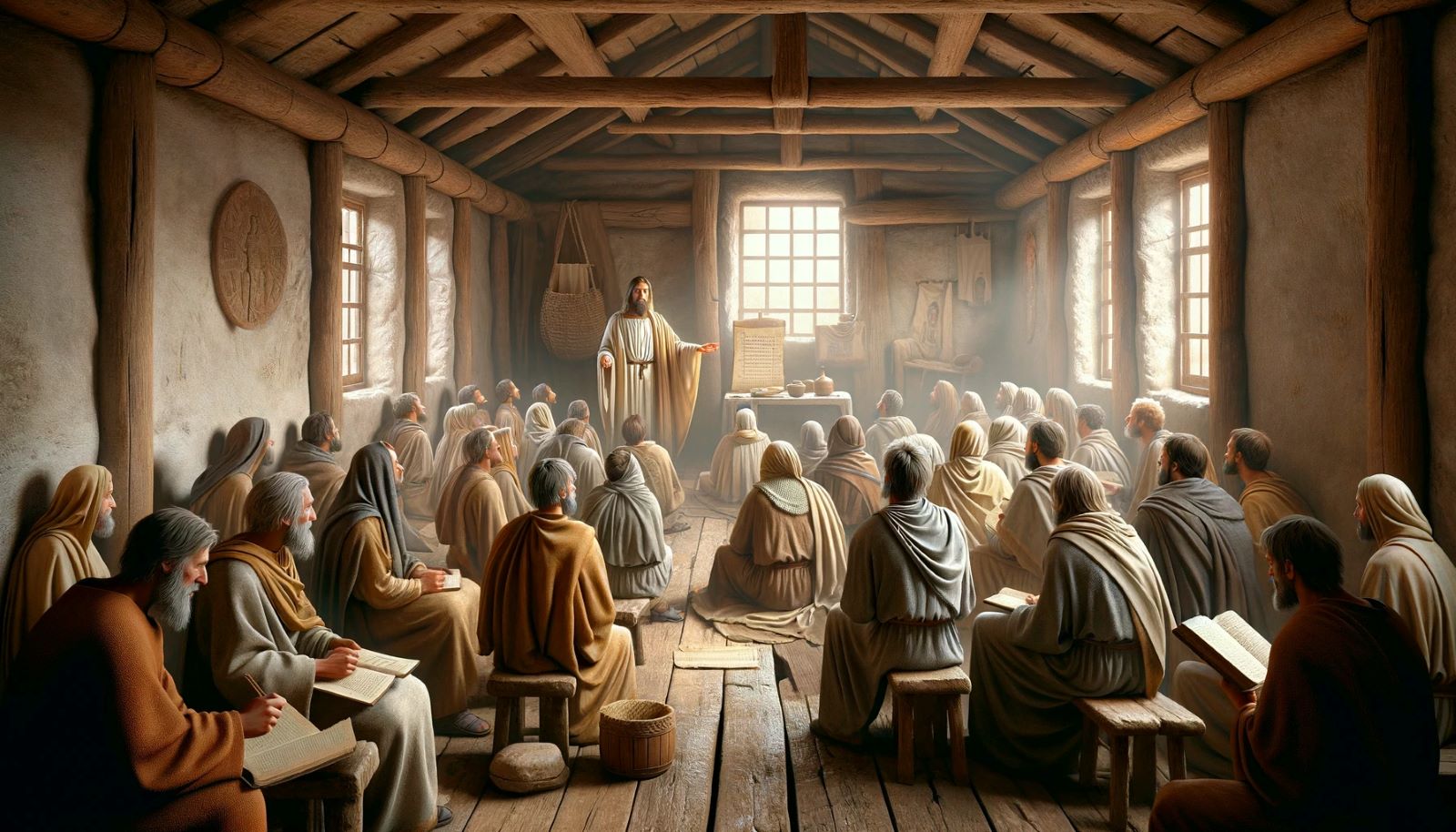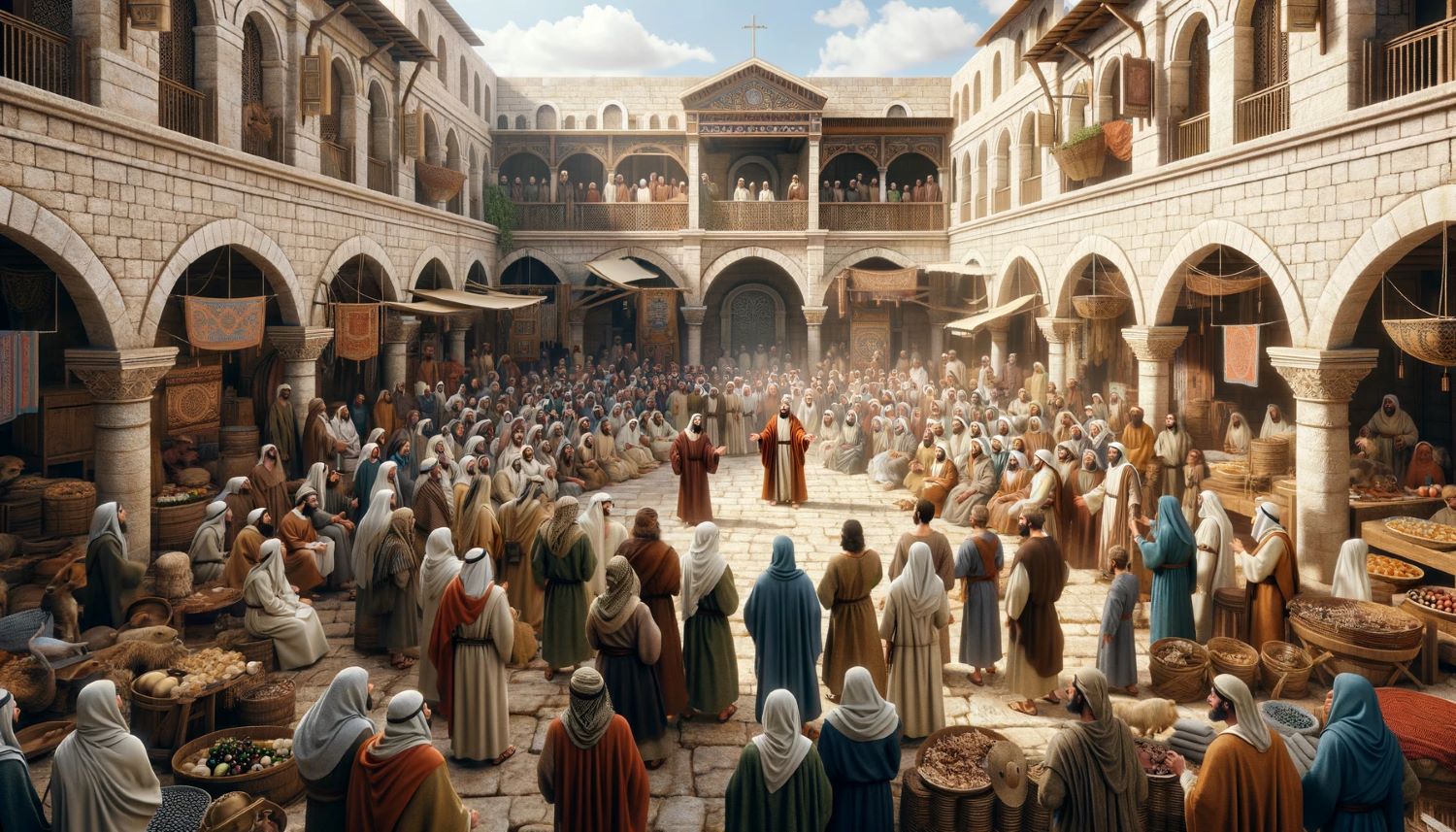Home>Bible Facts>Scripture Where Jesus Tells Apostles To Buy Swords


Bible Facts
Scripture Where Jesus Tells Apostles To Buy Swords
Published: February 19, 2024
Peter Smith, Editorial Director at Christian.net, combines deep insights into faith, politics, and culture to lead content creation that resonates widely. Awarded for his contributions to religious discourse, he previously headed a major organization for religious communicators, enhancing dialogue on faith's societal impacts.
Discover the significance of the scripture where Jesus instructs his apostles to buy swords. Explore this intriguing Bible fact and its implications.
(Many of the links in this article redirect to a specific reviewed product. Your purchase of these products through affiliate links helps to generate commission for Christian.net, at no extra cost. Learn more)
Table of Contents
Introduction
The scripture where Jesus tells his apostles to buy swords is a thought-provoking and often debated passage in the Bible. This intriguing directive from Jesus occurs in the New Testament, specifically in the Gospel of Luke, chapter 22, verses 35-38. The significance of this scripture extends beyond its literal meaning, sparking discussions about the nature of Jesus' teachings and the application of his words in various contexts.
This passage is notable for its apparent departure from Jesus' usual messages of peace and non-violence. It raises questions about the underlying message and purpose of Jesus' instruction to his disciples. Delving into the context, interpretation, historical and cultural background, and modern application of this scripture can shed light on its deeper meaning and relevance to contemporary life.
Read more: What Did Jesus Tell The Apostles To Do
Context of the Scripture
The context of the scripture where Jesus tells his apostles to buy swords is crucial for understanding the significance of this directive. This passage occurs during the Last Supper, a poignant and pivotal moment in the life of Jesus and his disciples. As they gathered to share this final meal before Jesus' crucifixion, the atmosphere was charged with emotion and anticipation.
In Luke 22:35-38, Jesus addresses his disciples, highlighting the imminent challenges they would face as they continued his work after his departure. He begins by recalling the earlier missions he had sent them on, during which they lacked provisions and faced adversity. Jesus prompts them to reflect on those experiences, asking if they lacked anything during their missions. The disciples respond, "Nothing," indicating that they were provided for despite the challenges they encountered.
Following this exchange, Jesus delivers a striking message, instructing his disciples, "But now if you have a purse, take it, and also a bag; and if you don't have a sword, sell your cloak and buy one." This directive appears to contrast with Jesus' usual teachings of peace and non-violence, prompting confusion and debate among scholars and believers.
The subsequent response from the disciples further underscores the perplexity surrounding Jesus' command. They reveal that they have two swords among them, to which Jesus enigmatically remarks, "That is enough." This enigmatic statement adds another layer of complexity to the passage, leaving room for diverse interpretations and scholarly discourse.
The context of this scripture within the Last Supper narrative is essential for grasping the underlying message and intent behind Jesus' directive. It serves as a poignant moment of preparation and transition, as Jesus equips his disciples for the challenges they will face in the absence of his physical presence. This context sets the stage for deeper exploration of the interpretation, historical and cultural background, and contemporary application of this thought-provoking scripture.
Interpretation of the Scripture
The interpretation of the scripture where Jesus tells his apostles to buy swords has sparked diverse perspectives and scholarly debate. One prevalent interpretation revolves around the symbolic and metaphorical significance of Jesus' directive. Proponents of this view argue that Jesus' command to buy swords symbolizes the spiritual warfare and challenges that his disciples would encounter in the future. In this interpretation, the swords represent the disciples' need to arm themselves with spiritual strength, resilience, and unwavering faith to confront the trials and opposition they would face in spreading the message of the Gospel.
Another interpretation delves into the contextual nuances of Jesus' words, emphasizing the figurative nature of his directive. Advocates of this perspective suggest that Jesus employed figurative language to convey deeper spiritual truths. The call to buy swords, within this framework, symbolizes the disciples' readiness to face persecution and spiritual battles as they embark on their mission to spread the teachings of Jesus. It underscores the necessity for spiritual preparedness and steadfastness in the face of adversity.
Conversely, some interpretations focus on the practical implications of Jesus' command. This viewpoint posits that Jesus' directive to buy swords reflects the disciples' need for physical protection in a hostile and dangerous environment. It underscores the pragmatic aspect of ensuring their safety and security as they ventured into unknown territories to fulfill their mission. This interpretation raises intriguing questions about the balance between spiritual trust and practical measures for self-defense in the disciples' journey.
Furthermore, the enigmatic statement "That is enough" following the disciples' revelation about the possession of two swords adds complexity to the interpretation. This cryptic remark has prompted extensive analysis, with scholars offering diverse explanations for its meaning. Some interpretations suggest that Jesus' statement signifies the sufficiency of the disciples' resources for the immediate challenges they would face, while others propose deeper symbolic connotations related to spiritual readiness and divine providence.
The multifaceted nature of the interpretation of this scripture underscores its richness and depth, inviting contemplation and exploration from various theological and scholarly perspectives. This thought-provoking passage continues to inspire profound reflection on the complexities of Jesus' teachings and their relevance to the spiritual, practical, and metaphorical dimensions of human existence.
Historical and Cultural Background
To comprehend the scripture where Jesus instructs his apostles to buy swords, delving into the historical and cultural backdrop of the time period is essential. During the era in which Jesus lived and ministered, the region of Judea was marked by political turbulence and social unrest. The oppressive Roman occupation cast a shadow over the daily lives of the Jewish populace, engendering a climate of subjugation and resistance.
In this context, the possession of swords held multifaceted significance. Swords were emblematic of power, protection, and authority. They were not only tools of self-defense but also symbols of strength and sovereignty. The Roman presence, characterized by its military might and stringent control, necessitated a nuanced understanding of the role of weaponry in the daily lives of the inhabitants of Judea.
Furthermore, the cultural dynamics of the time period underscore the intricate interplay between spiritual teachings and practical realities. Jesus' ministry unfolded within a society deeply entrenched in religious traditions and societal norms. The juxtaposition of spiritual principles with the pragmatic challenges of daily existence permeated the fabric of Jewish life.
The cultural symbolism associated with swords within the Jewish context adds layers of complexity to the interpretation of Jesus' directive. Swords held profound significance in Jewish history, evoking memories of pivotal battles, heroic figures, and the defense of the nation. Understanding the cultural connotations of swords within the Jewish collective consciousness enriches the exploration of Jesus' enigmatic command to his disciples.
Moreover, the historical backdrop of Jesus' ministry, characterized by societal upheaval and political tension, underscores the urgency and gravity of his message. The tumultuous socio-political climate of Judea during that period shaped the context in which Jesus imparted his teachings, influencing the nuances and implications of his words.
By delving into the historical and cultural milieu of the time, a deeper understanding of the complexities surrounding Jesus' directive to buy swords emerges. This exploration illuminates the intricate interplay between historical context, cultural symbolism, and the spiritual dimensions of Jesus' teachings, offering profound insights into the enigmatic passage and its enduring relevance.
Application to Modern Times
The scripture where Jesus instructs his apostles to buy swords resonates with profound implications for contemporary society, prompting thoughtful reflection on its relevance in modern times. While rooted in a specific historical and cultural context, the underlying principles encapsulated in Jesus' enigmatic directive transcend temporal boundaries, offering timeless wisdom and guidance for individuals and communities today.
In a world marked by diverse challenges, the metaphorical essence of the swords as emblematic of spiritual preparedness and resilience holds poignant relevance. The call to "buy swords" can be interpreted as a compelling exhortation for individuals to equip themselves with spiritual fortitude, moral steadfastness, and unwavering faith in navigating the complexities of the modern era. It underscores the imperative of cultivating inner strength and resilience to confront the myriad trials and tribulations that characterize contemporary existence.
Furthermore, the practical implications of Jesus' directive prompt contemplation on the balance between spiritual trust and practical measures for self-protection in today's world. The discourse surrounding the ethical and moral dimensions of self-defense, personal safety, and societal security intersects with the timeless teachings encapsulated in Jesus' enigmatic command. This intersection invites introspection on the ethical considerations and moral imperatives associated with the pursuit of peace, justice, and the preservation of life in the modern context.
Moreover, the enigmatic statement "That is enough" following the disciples' revelation about the possession of two swords invites contemplation on the sufficiency of resources and preparedness in the face of contemporary challenges. This cryptic remark serves as a poignant reminder of the need for discernment, prudence, and spiritual readiness in navigating the complexities of the modern world.
The multifaceted nature of the scripture's application to modern times underscores its enduring relevance and capacity to engender profound introspection and dialogue. It serves as a timeless beacon of wisdom, inviting individuals and communities to grapple with the complexities of contemporary existence while drawing inspiration from the profound teachings encapsulated in Jesus' enigmatic directive.
In essence, the scripture where Jesus instructs his apostles to buy swords transcends the confines of antiquity, offering timeless insights and guidance for navigating the spiritual, ethical, and practical dimensions of modern life. Its enduring relevance underscores the profound and transformative nature of Jesus' teachings, resonating with humanity across temporal and cultural divides.
Read more: Where Can I Buy An Advent Candle
Conclusion
The scripture where Jesus instructs his apostles to buy swords encapsulates profound layers of meaning, inviting contemplation and scholarly discourse across theological, historical, and cultural domains. The enigmatic nature of Jesus' directive, set within the poignant backdrop of the Last Supper, underscores the complexity and richness of his teachings. The multifaceted interpretations of this scripture, ranging from the symbolic and metaphorical to the practical and historical, reflect the enduring enigma and depth of Jesus' words.
Delving into the historical and cultural milieu of the time period illuminates the intricate interplay between societal upheaval, political tension, and the spiritual urgency of Jesus' message. The symbolism of swords within the Jewish context, steeped in historical significance and cultural connotations, adds profound layers of complexity to the interpretation of Jesus' directive. Understanding the historical and cultural backdrop enriches the exploration of this enigmatic passage, offering profound insights into its enduring relevance and implications for contemporary life.
The scripture's application to modern times resonates with timeless wisdom, prompting reflection on the balance between spiritual preparedness and practical considerations in navigating the complexities of the modern era. It serves as a compelling exhortation for individuals to cultivate inner strength, moral steadfastness, and unwavering faith, while also inviting contemplation on the ethical dimensions of self-defense, personal safety, and societal security. The enigmatic statement "That is enough" continues to evoke introspection on the sufficiency of resources and preparedness in the face of contemporary challenges, serving as a timeless reminder of the need for discernment, prudence, and spiritual readiness.
In essence, the scripture where Jesus instructs his apostles to buy swords transcends temporal and cultural boundaries, offering timeless insights and guidance for navigating the spiritual, ethical, and practical dimensions of human existence. Its enduring relevance underscores the profound and transformative nature of Jesus' teachings, resonating with humanity across generations. This thought-provoking scripture continues to inspire profound reflection on the complexities of Jesus' teachings and their enduring significance in the tapestry of human experience.














